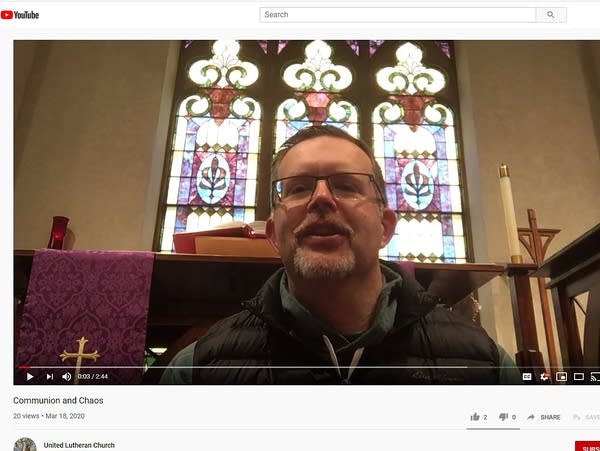With buildings closed, Minnesota faith leaders stay connected with congregations

Go Deeper.
Create an account or log in to save stories.
Like this?
Thanks for liking this story! We have added it to a list of your favorite stories.
Churches, mosques, temples and synagogues across Minnesota are closed to slow the spread of the coronavirus. That means people of faith are facing new routines this weekend.
So are faith leaders. Some will be preaching to empty sanctuaries or speaking from home, leading services for people watching on their phones and computers.
Justin Boeding, directing pastor at United Lutheran in Red Wing, said times feel uncertain for everyone.
“It was a fairly easy decision to call off Sunday morning, Wednesday night programming — but when you don’t know the duration that it’s going to last, I would say there is some unease right now among church leaders in this community,” he said.
Turn Up Your Support
MPR News helps you turn down the noise and build shared understanding. Turn up your support for this public resource and keep trusted journalism accessible to all.
Boeding has been recording daily mini-sermons to post online. For other leaders, live-streaming services present a serious learning curve. Some are scrambling to set up YouTube channels, master Zoom meetings, or learn other platforms for sharing videos. A few churches in the state are offering drive-in worship services, where people sit in their cars in a parking lot and tune in on the radio.
First Lutheran Church in Bemidji has offered drive-in services in the summers since the 1950s. This year, they're starting early, with a drive-in service in the church parking lot on Sunday.
"They're all kinda quarantined in our own little vehicles," said Senior Pastor Corey Furhman. "And it's some joy in the midst of a very kind of scary time for folks."
Fuhrman said that next weekend, the drive-in service will move to a school parking lot that has more room. He plans to invite other local congregations to participate.
Christ the King Lutheran Church in Mankato is offering drive-thru communion and prayer.
In Minneapolis, Marcia Zimmerman is the senior rabbi at Temple Israel, which is actively reaching out to congregants young and old through the web and teaching the necessary technology to its members. The response has been big.
“We have made it possible for our daily worship service to be online, and instead of having the traditional 10 people who show up at temple, over 60 people engaged in daily worship. And so, we are actually meeting the needs and engaging more people, having had to not be at temple, the physical place,” she said.
There are lower-tech options, too. Some congregations are establishing phone trees and even launching letter writing campaigns for children and seniors alike.
Regardless of how they reach out, the point is to connect with each other, to ease anxiety and social isolation, and to offer the assurance of scriptures that — as Zimmerman points out — have plenty to say about living in challenging times.
Patrick Cabello Hansel is co-pastor of St. Paul’s Lutheran Church in Minneapolis. The Spanish-speaking, largely immigrant congregation has been hit hard by the sudden slowdown of service-industry work. Part of his outreach includes fighting coronavirus rumors with facts. A few days ago, a rumor circulated in his community that the president had placed the entire nation under a two-week quarantine. Hansel planned to send an email or text to his congregation, clearing up the false rumor.
Still, Hansel said, not everything can be done from a distance.
“The problem for me as a pastor right now is I can’t go and visit people in the hospital or in a nursing facility,” he said. “And there are some people that are really lonely. One person I can call on the phone, but another person is in and out of consciousness and it may be an end-of-life situation, and I can’t go and minister to her. That does weigh heavily on me.”
He understands the needs to keep visitors out, but still, he said, “it hurts.”
The Hindu New Year, Passover, Easter and the start of Ramadan all take place in the coming weeks. All these are major events that under normal circumstances bring people together and require lots of preparation.
It’s hard to plan right now. But Rabbi Zimmerman said that, with many places closed down, there’s also an opportunity to get back to the basics.
“We’re powering down … all the stuff and distractions, and being really clear about finding meaning in this period of time,” she said.
Faith leaders and their congregations have tools at their disposal: prayers, rituals, sacred texts, and the ability to reach out to others — in all those new ways — to share an age-old message: “You’re not alone.”
MPR’s Kirsti Marohn contributed to this report.




